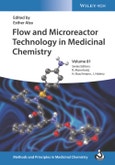Learn to master a powerful technology to enable a faster drug discovery workflow
The ultimate dream for medicinal chemists is the ability to synthesize new drug-like compounds with the push of a button. The key to synthesizing chemical compounds more quickly and accurately lies in computer-controlled technologies that can be optimized by machine learning. Recent developments in computer-controlled automated syntheses that rely on miniature flow reactors - with integrated analysis of the resulting products - provide a workable technology for synthesizing new chemical substances very quickly and with minimal effort.
In Flow and Microreactor Technology in Medicinal Chemistry, early adopters of this ground-breaking technology describe its current and potential uses in medicinal chemistry. Based on successful examples of the use of flow and microreactor synthesis for drug-like compounds, the book introduces current as well as emerging uses for automated synthesis in a drug discovery context.
Flow and Microreactor Technology in Medicinal Chemistry readers will also find: - Numerous case studies that address the most common applications of this technology in the day-to-day work of medicinal chemists - How to integrate flow synthesis with drug discovery - How to perform enantioselective reactions under continuous flow conditions
Flow and Microreactor Technology in Medicinal Chemistry is a valuable practical reference for medicinal chemists, organic chemists, and natural products chemists, whether they are working in academia or in the pharmaceutical industry.
The ultimate dream for medicinal chemists is the ability to synthesize new drug-like compounds with the push of a button. The key to synthesizing chemical compounds more quickly and accurately lies in computer-controlled technologies that can be optimized by machine learning. Recent developments in computer-controlled automated syntheses that rely on miniature flow reactors - with integrated analysis of the resulting products - provide a workable technology for synthesizing new chemical substances very quickly and with minimal effort.
In Flow and Microreactor Technology in Medicinal Chemistry, early adopters of this ground-breaking technology describe its current and potential uses in medicinal chemistry. Based on successful examples of the use of flow and microreactor synthesis for drug-like compounds, the book introduces current as well as emerging uses for automated synthesis in a drug discovery context.
Flow and Microreactor Technology in Medicinal Chemistry readers will also find: - Numerous case studies that address the most common applications of this technology in the day-to-day work of medicinal chemists - How to integrate flow synthesis with drug discovery - How to perform enantioselective reactions under continuous flow conditions
Flow and Microreactor Technology in Medicinal Chemistry is a valuable practical reference for medicinal chemists, organic chemists, and natural products chemists, whether they are working in academia or in the pharmaceutical industry.
Table of Contents
INTRODUCTIONContinuous flow technology for the fine chemical and pharmaceutical Industries.
CASE STUDIES
Novel (forbidden) chemistry towards NCE to increase chemical space
Enantioselective catalysis in continuous flow to improve throughput
Synthesis in continuous flow of important drugs and APIs
TECHNOLOGIES
HTE in continuous flow to speed library synthesis
Integration systems with continuous synthesis and biological screening
Microreactors for target validation (organ on a chip)
Process Analytical Technologies (PAT) and tools for controlled process design
Artificial Intelligence, Machine Learning and automatization in drug discovery
Emerging market challenges and on demand manufacturing








